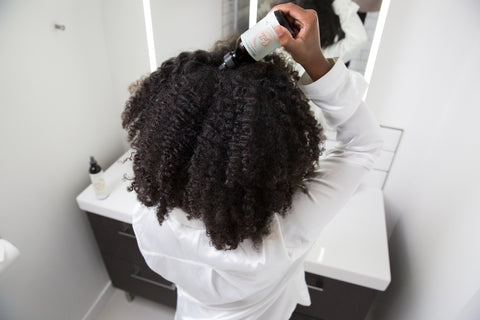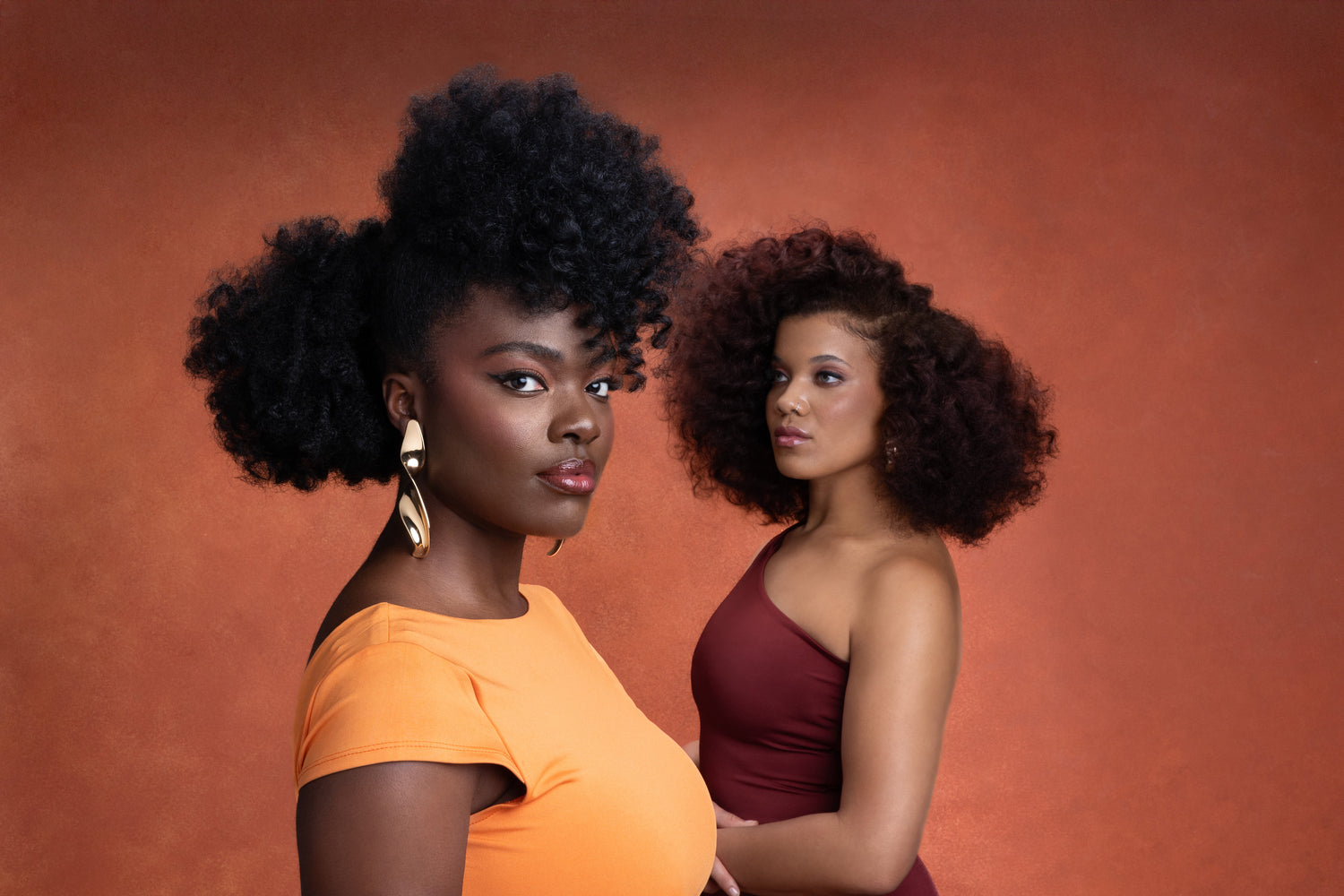Main Body Copy:
Itchy scalp (also known as scalp pruritus) is one of the most frustrating, yet common problems that many people with Afro hair and others face. Often an itchy scalp is paired with a dry scalp or flaky skin, but sometimes your scalp can be itchy without any of these changes. Regardless, it’s a nuisance whether you are in the boardroom, hanging out with friends, on a busy commute or on a date.
Wondering why your scalp is so itchy? An itchy scalp can be tricky to get to the root of but our comprehensive guide covers everything: from what causes an itchy scalp, how to treat an itchy scalp or how to prevent an itchy scalp. Just use our table of contents (below) to navigate with ease.
Itchy Scalp Table of Contents:
- Causes
- Symptoms
- Itchy Scalp and Hair Loss
- Itchy Scalp Treatment & Products for Itchy Scalp
- Prevention
A. Itchy Scalp Causes
So, what causes an itchy scalp? There are many itchy scalp causes, but the most common include dandruff, allergic reactions, product build up or simply having a dry scalp. These issues often show up more intensely as an itchy scalp in Black hair, especially when the scalp is dry or product buildup is high.

Dandruff
Dandruff is also known as seborrheic dermatitis or in children it’s called cradle cap or crib cap and is caused by the overgrowth of Malassezia yeast. Now, don’t be alarmed: all scalps are home to this Malassezia yeast but when it goes into overdrive this is when dandruff can occur. If you have dandruff, you’ll notice that your scalp will have large, yellowish flakes, as well as being oily, red and itchy. This buildup can be even more noticeable when dealing with an itchy scalp in Afro hair, as flakes can get trapped between curls and coils. Want to know how to treat dandruff? Head to our treatment section.
Allergic Reaction
An allergic reaction (also known as contact dermatitis) could be the cause of your itchy scalp. Sensitivity to artificial fragrances (parfum) and sodium lauryl sulphate (SLS) can lead to itchiness. Some scalps are more sensitive than others but a lot of mainstream products contain artificial fragrances which can cause asthma, eczema, muscle pain, bloating, sinus pain, fatigue, eye irritation, gastrointestinal problems, headaches, dizziness and burning or itching skin irritations.
We believe all women should be able to access safe and effective haircare at their convenience, that's why all of our products are 97-100% natural and we never use parabens, sulphates, phthalates, harsh preservatives or artificial fragrances.
Think that an allergic reaction could be the cause of your itchy scalp? Then it’s time to do some investigating and analyse the ingredients list of your products. You can also read our guide to understanding the ingredient list on your products.
Product Build Up
Product build up can occur when the scalp comes in continuous contact with products that aren’t meant for it. You may be co-washing with a regular conditioner or even using a ‘co-wash’ conditioner or shampoo targeted towards afro and curly hair. Does this sound like product build up could be the reason for your itchy scalp? You can find out how to treat product build up in our treatment section.
Dry Scalp
Have an extremely itchy scalp? It simply could be that you have dry skin. Dry skin can be itchy regardless of where it is on your body. So just as the skin on your arm gets itchy when it’s dry, so does your scalp. If you suspect that you have a dry scalp try to keep your skin hydrated so it is smoothed, as if it is left untreated it can easily become irritated and itchy.
An easy way to combat a dry scalp is to use a scalp oil. Soothe was designed to help ease the itchiness. Its anti-inflammatory properties also work to combat dryness and promote healthy hair growth. Just apply to your scalp immediately after washing and a couple of times throughout the week to keep dryness at bay.
B. Symptoms of Itchy Scalp

Not sure if you have an itchy scalp? Here are some of the symptoms you might be experiencing with your itchy scalp:
- Dry scalp
- Irritated skin
- Redness
- Hair thinning/hair loss
- Sore scalp
- Flaky scalp
NB: If you are suffering from excessive itching and if this is accompanied by other symptoms like bald patches, fever or swelling, it's best to book an appointment with your GP or trichologist as soon as possible.
C. Itchy Scalp and Hair Loss
Have you noticed that your itchy scalp is paired with hair loss? We would always recommend first seeking medical advice, so book an appointment with your GP or trichologist as soon as possible.
However, there are many reasons that you might be experiencing hair loss with an itchy scalp such as stress or excessive styling, and a really common reason is excessive scratching.
Excessive scratching can weaken the roots of your hair and can cause it to fall out. If you find that you are experiencing hair loss and an itchy scalp, try to treat your itchy scalp first to see if this helps. You can do this by implementing a simple hair care routine and reading our treatment section, below.
D. Treatment: How To Stop an Itchy Scalp
At Afrocenchix, we always stress the importance of a healthy, balanced hair care routine. It's crucial for a healthy scalp. Want to know how to stop an itchy scalp with Black hair? We’ve outlined the key treatments for itchy scalp, below.
Products For Itchy Scalp

Looking for products to help with your itchy scalp? As we mentioned earlier, a lot of mainstream products contain artificial fragrances which can cause asthma, eczema, muscle pain, bloating, sinus pain, fatigue, eye irritation, gastrointestinal problems, headaches, dizziness and burning or itching skin irritations. So we would recommend using products (like Afrocenchix) which are safe, natural and effective, that you use with your simple hair routine. However, we’ve outlined the most key, below.
Sulphate-free Shampoo
Looking for an ‘itchy scalp shampoo’? You should aim to wash your hair every 7-10 days using a mild, sulphate-free shampoo. This includes when you have your hair in a protective style. This will ensure that there is no scalp build-up, that you remove enough sebum, and that dirt and dust is gone.
Swish was formulated to be gentle enough to use once a week. Our sulphate free shampoo gives your hair a crisp clean and removes buildup without stripping your hair of moisture.
Scalp Oil
Looking for the best oil for an itchy scalp? Using a scalp oil with ingredients such as lavender and eucalyptus can relieve itchiness.
Soothe was designed to help ease the itchiness that may have been caused due to scalp build up. Its anti-inflammatory properties also work to combat dryness and promote healthy hair growth. Applying such an oil to your scalp immediately after washing and a couple of times throughout the week should do the trick.
Seek Medical Advice
An itchy scalp is easier to treat if you know what the problem is. Unfortunately it's not always that straightforward. If you are suffering from excessive itching and if this is accompanied by other symptoms like bald patches, it's best to book an appointment with your GP or trichologist as soon as possible.
Home Treatments & Remedies For Itchy Scalp
If you are experiencing an itchy scalp you might be tempted to reach for home remedies. But we would always advise against creating home remedies as many don’t work. These homemade treatments could possibly make your itchy scalp worse, so you are better off just avoiding them.
We recommend reading the treatment and prevention sections of this article and seeking medical advice if your scalp issues continue.
E. Itchy Scalp Prevention

As we mentioned, previously, it’s important to have a healthy, balanced hair care routine for a happy scalp. It’s important to treat an itchy scalp as soon as you identify or notice it. If left in the future, it can lead to other scalp conditions such as dandruff (micro-inflammation), seborrheic dermatitis (inflammation), folliculitis (inflammation), hair thinning and hair loss.
1. Check The Ingredients In Your Hair Products
Sensitivity to artificial fragrances (parfum) and sodium lauryl sulphate (SLS) can lead to itchiness. Artificial fragrances are used in many products while sodium lauryl sulphate is often found in shampoos and is the cleansing agent responsible for foaming. Not only can SLS cause itching, it is extremely drying to Afro hair so it's better to opt for a shampoo that uses a gentler cleansing agent like cocamidopropyl betaine or cocamidopropyl hydroxysultaine.
2. Clean Your Scalp Regularly
An itchy scalp may simply be a sign that you need to wash your hair more frequently. The build-up of dirt and pollution can cause itchiness. If you notice your hair is okay for the first few days after washing and becomes itchier as time progresses, it's a good idea to decrease the time between your wash days. We recommend washing your hair every 7-10 days with a sulphate-free shampoo and every two weeks if you are wearing protective hairstyles like braids.
3. Use a Scalp Oil
Having a consistent hair routine can make the world of a difference. Using a scalp oil with ingredients such as lavender and eucalyptus can relieve itchiness. Applying such an oil to your scalp immediately after washing and a couple of times throughout the week should do the trick. Our scalp oil Soothe has been especially formulated to relieve itchiness.
More Articles:
Do I Really Need to Use a Scalp Oil?

